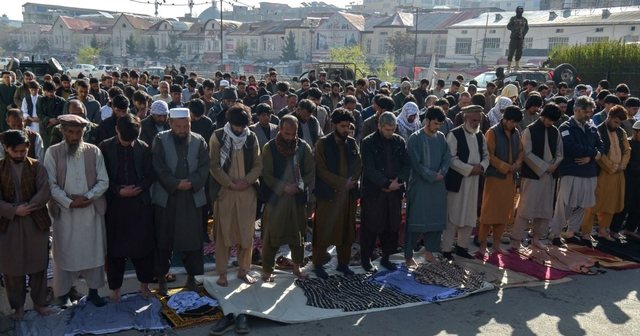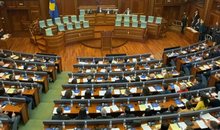
 Flash News
Flash News
Last night she escaped the assassination attempt/ Who is Katerina Beqo, the woman who was in the car with her little son when her husband was executed (Event)
Suspected of being used in the murder of Gjovalin Prendit, a vehicle is found burned in Fushë Gjormë
"Albania couldn't hold on", Lara Colturi chooses Italy for her career
Assassination with 4 injured in Tirana, perpetrators confused target, were going to execute Roan Brahimi's wife
VIDEO/ Diaspora vote, Albanian shows the middle finger to the SP
UN: Taliban are arresting men because of hairstyle and non-forgiveness

The "morality police" in Afghanistan have arrested men and their barbers because of their hairstyle and have also arrested other men after they did not go to mosques to pray during the month of Ramadan. This was said in a United Nations report published on April 10, six months after the laws governing the behavior of people in Afghanistan came into force.
The Ministry of Vice Prevention and Promotion of Virtue in Afghanistan published the new laws in August last year. The legislation covers many aspects of daily life in Afghanistan, including public transport, music, beard trimming, and celebrations. Among the laws adopted by this ministry is the ban on women's voices and uncovered faces in public.
That same month, a senior UN official warned that the laws represent "a worrying picture" for the country's future, as they add to existing restrictions on women and girls in terms of employment, education and the dress code. The Taliban have rejected the UN's concerns about morality laws.
In Thursday's report, the UN mission in Afghanistan said that in the first six months of implementing these laws, over half of the arrests involved "either men who did not have the beard length or hairstyle in accordance with the rules, or with barbers offering beard cuts or haircuts that did not comply with the rules".
The report also said that the "morality police" routinely arrest people "without undergoing due process or respecting legal protections". During the month of Ramadan, men's compulsory participation in prayer has been closely monitored, and this has often led to arrests of those who did not attend prayers, the report said.
The UN mission said that the two genders have been negatively affected by the laws, especially people who have small businesses such as private education centers, barbers and hairdressers, tailors, businesses that provide services for weddings and restaurants. This has led to a complete reduction or loss of income and employment opportunities.
According to the report, direct and indirect socio-economic impacts from law enforcement are likely to further aggravate the dire economic situation in Afghanistan. A World Bank study has estimated that banning women from studying and working could cost the state $1.4 billion a year. According to the UN report, more than 3.300 inspectors are engaged in informing people about laws and their enforcement./REL
Latest news



Berisha: A judge ordered SKAP to investigate Rama for the villa in Surrel
2025-04-18 12:20:51





BKH agents attacked, Fier court leaves Agron Kapllanaj's grandchildren in prison
2025-04-18 11:22:14
"Albania couldn't hold on", Lara Colturi chooses Italy for her career
2025-04-18 11:10:50
Rubio: We will withdraw from Russia-Ukraine peace deal if there is no progress
2025-04-18 10:58:18


Beyond the horizon, life goes on! Black Friday and Easter
2025-04-18 10:31:31

VIDEO/ Diaspora vote, Albanian shows the middle finger to the SP
2025-04-18 10:10:47
Ajola Xoxa appears before SPAK, implements the "compulsory appearance" measure
2025-04-18 09:58:34





Foreign exchange, April 18, 2025
2025-04-18 08:58:05
Germany needs construction workers
2025-04-18 08:55:05


Horoscope, what do the stars have in store for you today?
2025-04-18 08:23:30
Temperatures reach up to 24 degrees, weather forecast
2025-04-18 08:08:21
Posta e mëngjesit/ Me 2 rreshta: Çfarë pati rëndësi dje në Shqipëri
2025-04-18 07:52:20

Assassination in Tirana, police react: 4 injured in Trauma, two of them minors
2025-04-17 22:34:30
Gunfire in Tirana, 4 people injured
2025-04-17 22:16:15

Tirana Incinerator, Lala: Officials were punished as if they stole a chicken
2025-04-17 21:50:29
Wealth Zodiac: Who has the money magnet?
2025-04-17 21:47:18





Assassinations in Lezha Plain, Roan Brahimi's father is killed
2025-04-17 20:29:59

The first 600 ballots from the diaspora arrive in Albania
2025-04-17 19:52:59

Farmers who make BÉ-eee and farmers of the EU!
2025-04-17 19:30:47

Tobacco: 0% tax for freelancers, PD with a clear plan for the middle class
2025-04-17 19:07:05

Car hits 9-year-old child in Pogradec
2025-04-17 18:42:15
Alizoti accuses SPAK: It has failed in supervising the elections
2025-04-17 18:31:42
Mental health alert: Work without limits, mind under pressure
2025-04-17 18:09:04
Two vehicles collide, 29-year-old dies in Tirana
2025-04-17 18:01:45
Rama from Dibra: Half of Albanian men are syrians, the rest vote for the DP!
2025-04-17 17:55:58
Top Ukrainian, European and American leaders meet in Paris
2025-04-17 17:45:35

"Metamorphosis", the Court takes time on the way to judge the defendants
2025-04-17 17:24:50

Trump's tariffs could bring Putin closer to peace
2025-04-17 17:06:27
Accident with 3 injured on the Kukes-Krume axis, 27-year-old arrested
2025-04-17 16:41:24
The fires that are burning Albania
2025-04-17 16:36:38

The husband of Rama's former minister in Kosovo is arrested again
2025-04-17 16:14:07
This is the country with the highest road accident death rate in the EU
2025-04-17 16:00:37

ECB cuts rates to 2.25% amid Trump trade war
2025-04-17 15:38:26

They hit the wife and mother, two arrested in Lezha for domestic violence
2025-04-17 15:13:15

Who is the new Prime Minister of Serbia, Gjuro Macut?
2025-04-17 14:43:03
Court hearing on 'Sterilization' case postponed
2025-04-17 14:40:04
Knife injury in Milot, caused by wrong overtaking
2025-04-17 14:33:42
William Levy released from prison
2025-04-17 14:16:25
Këlliçi: Rama uses sexist and offensive language towards women and girls
2025-04-17 14:05:30

Not a campaign, but a story/ Garo 'takes' ASHM candidates to another level
2025-04-17 13:41:08



Berisha: We are facing the philosophy of extorting businesses and citizens
2025-04-17 13:07:36
Fight breaks out in Tirana, 8 arrested, injured man hit with pistol butt
2025-04-17 12:57:23

Unjust dismissals from the administration, court decisions lingered
2025-04-17 12:29:59

Nuredin Dumani threatens lawyer, "Golden Bullet" hearing interrupted
2025-04-17 12:13:18



With guns and cocaine, thieves flee from police, crashing into officers' car
2025-04-17 11:35:27



Iran says it is ready to address US concerns about its nuclear program
2025-04-17 10:56:49
Navigation of small craft and fishing vessels suspended
2025-04-17 10:45:32
The hearing at the GJKKO for the "5D" file is postponed again
2025-04-17 10:33:43
Zeno's Arrow and Albania in the EU
2025-04-17 10:21:47
Teacher arrested for sexually harassing underage students in Librazhd
2025-04-17 10:07:07

Accusations of collaboration with Rama, Soros rejects comments to "Fox News"
2025-04-17 09:45:32
Foreign exchange/ How much foreign currencies are bought and sold today
2025-04-17 09:42:44
